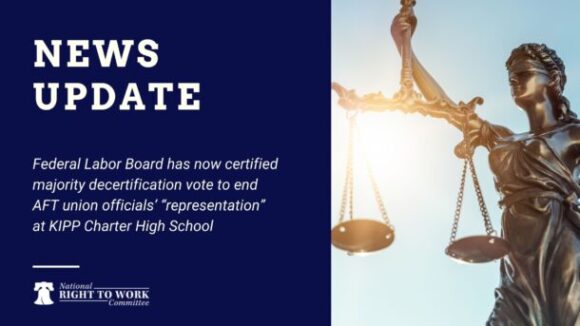Will Team Biden Weaponize Workers’ Pensions?
Big Labor abuse of worker pension and benefit funds as a means of advancing union bosses’ self-aggrandizing policy objectives is a familiar phenomenon.
Last week President Obama waxed nostalgic about the “good old days” when union bosses wielded monopoly power in the workplace over more than a third of private-sector employees in America.
The President seemed totally unaware of the fact that Big Labor routinely exercised its privileges to the detriment of most of the employees under its control. Of course, this remains true today, except that roughly 7% of the private-sector workforce, rather than 35%, is directly subject to union officials’ whims.
An acclaimed new biography of jazz titan Duke Ellington by Wall Street Journal drama critic Terry Teachout serves as a reminder of how in the 1940’s even extraordinarily talented and popular figures in the entertainment world couldn’t afford to defy (at least not openly!) the union hierarchy’s dictates. (See the New York Times review of the biography in the link below.)
In Chapter 12 of The Duke: A Life of Duke Ellington, Teachout sets the scene. At the beginning of 1941, top bosses of the American Society of Composers, Authors and Publishers (ASCAP), a “performing-rights organization” that was effectively a union, were “determined to extract more money from the radio networks for the privilege of airing songs written by [ASCAP] members . . . .” Rather than accept the 100% increase in licensing fees demanded by the ASCAP brass, the networks helped set up a competing union, Broadcast Music Inc (BMI), and also sought out arrangements of public-domain songs to air. Some 1.25 million ASCAP songs, including nearly all the top hits of 1940, could no longer be heard on the radio as of January 1, 1941.
The labor dispute presented a huge problem for Ellington, a jazz composer, bandleader and pianist. The public performances of Ellington and his men were regularly broadcast on the radio, and the overwhelming majority of their repertoire consisted of songs written or cowritten by Ellington, but controlled by ASCAP. For the 10 months that ASCAP bosses persisted in demanding a doubling of royalty collections, none of Ellington’s compositions could be performed on the radio.
Ellington’s fellow pianist and protege Billy Strayhorn had already been with the band for several years in early 1941, but had yet to establish himself as a composer. Fortunately for Ellington and his men and jazz lovers everywhere, Strayhorn was not an ASCAP member and, consequently, did not have to obey ASCAP dictates, or risk ending his career.
As a consequence of the ASCAP power grab, an until-then obscure Strayhorn composition called “Take the A Train” quickly became the Ellington band’s new theme song, and a number of other stellar Strayhorn efforts were also soon being heard over the airwaves.
But Strayhorn alone could not compose fast enough to make up for the loss of hundreds of Ellington songs written from the early 1920’s through 1940. To lend a hand to Strayhorn, the Duke “pulled a rabbit out of his hat,” in Teachout’s words. He announced to the press that his son Mercer, then in his early twenties, would be joining the band.
Mercer Ellington was a classically trained musician who did indeed aspire to write for his father’s band, but as of the beginning of 1941 he had composed only one song that “his old man had been willing to record, a formulaic . . . instrumental called ‘Pigeons and Peppers’ . . . .”
But once Duke had to take a sabbatical from composing to avoid incurring ASCAP bigwigs’ wrath, Mercer began offering a series of songs still remembered by Ellington band aficionados today, including “Blue Serge,” “Jumpin’ Punkins,” and “Moon Mist.”
Did Mercer actually write these songs? It’s clear that, at a minimum, his father offered plenty of guidance. Teachout writes:
It was no coincidence that all of the pieces that Mercer produced during this time sounded as though his father had composed them, for they were written under Ellington’s close supervision: “He’d set problems for me, scratch out what he thought was in poor taste, and preset harmonies for me to write melodies against.”
Can it really be that a system that forces any laborer, ordinary or extraordinary, to resort to such tricks in order to continue earning a living is a formula for the prosperity of employees or anyone else? Common sense tells us “No,” but President Obama keeps insisting that, despite all the evidence to the contrary, the answer is “Yes.”

Big Labor abuse of worker pension and benefit funds as a means of advancing union bosses’ self-aggrandizing policy objectives is a familiar phenomenon.

What impact does handing a union monopoly power to deal with your employer on matters concerning your pay, benefits, and work rules have on your pay?

Federal Labor Board has now certified majority decertification vote to end AFT union officials’ “representation” at KIPP Charter High School